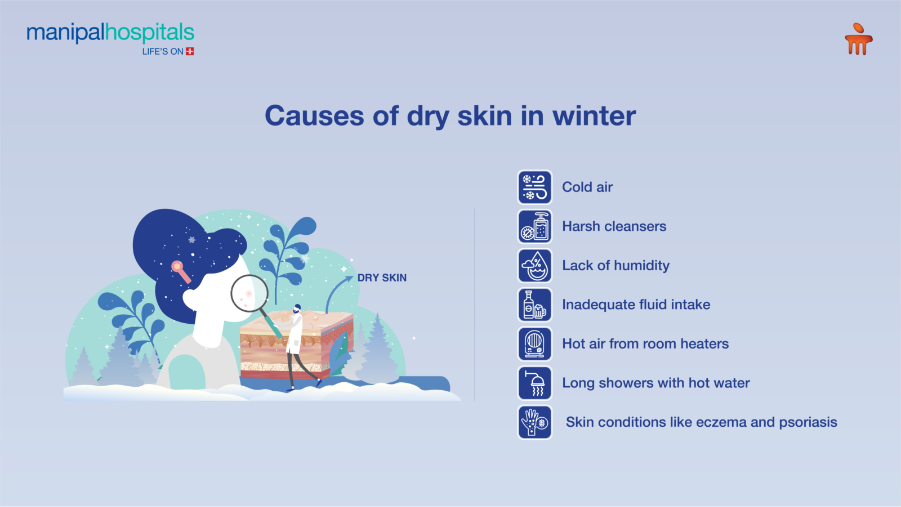
Winter brings cosy mornings and cool breezes, but it can be harsh on your skin. The cold air, low humidity, and indoor heating often lead to dry skin in winter, leaving it rough, itchy, and irritated. With the right winter skin care routine and a few daily habits, you can keep your skin soft, smooth, and healthy throughout the season.
Synopsis
Causes of Dry Skin
Dry skin can have several causes, and some have been listed below:
-
Genetics: genetics determine the skin type of an individual by affecting sebum production. People with dry skin do not produce enough sebum, leading to chronic skin dryness.
-
Environmental factors: cold weather, low humidity, and dry climate are some common environmental factors behind skin dryness.
-
Age: dryness in skin is more common with increasing age. People aged 40 and above are more prone to dry skin than those who are younger.
-
Medical conditions: certain medical conditions, like diabetes, psoriasis, eczema and thyroid disease may cause persistent dry and itchy skin.
-
Medications and treatments: medications like diuretics, antacids and statins cause dry skin upon long-term use. Radiation and chemotherapy used in cancer treatment also cause dry patches on the skin.
-
Harsh soaps: harsh soaps containing sulphates and parabens drain moisture from skin, leading to skin dryness.
Dry skin in winter
Dry skin is a common problem during winter. Cold air and low humidity can strip skin from its natural moisture and make it dry. Chronic skin conditions, like eczema, also flare up during winter. This leads to itchiness and irritation.
Reasons for Dry Skin in winter
Dry skin in winter is especially common due to environmental and lifestyle factors. Some major reasons include:

-
Cold air: cold air is one of the biggest reasons behind dry skin in winter. It draws out moisture from the skin, leading to dryness and flakiness.
-
Low humidity: humidity reduces significantly during winter, leading to dry skin and cracking.
-
Indoor heating systems: indoor heating systems are also responsible for dry skin in winter. They let out dry, hot air to keep homes warm, but cause skin dryness by drawing out moisture.
-
Hot baths and showers: It is common take hot baths during winter. But prolonged exposure to hot water can cause skin damage. This leads to redness, irritation and even burns.
-
Reduced sunlight: In winter, many places experience significant lack of sunlight. This leads to insufficient vitamin D absorption, which can weaken skin barrier and cause skin dryness.
-
Reduced water intake: People often tend to drink less water during winter, but this may lead to dehydration and skin dryness.
Winter Dryness on Face
The face is particularly vulnerable to winter dryness as it is exposed to the harsh cold winds during winter. Using harsh cleansers and skipping moisturiser can increase dryness. Some simple ways to prevent dryness on face on winter are:
-
Washing your face with a gentle, hydrating cleanser
-
Using a thick, non-comedogenic moisturiser twice a day
-
Avoid over-exfoliating or using harsh face scrubs
-
Use sun protection daily even in winter, to prevent damage from UV rays
Risks of Untreated Dry Skin
Dry skin is not a dangerous issue, but leaving it untreated can cause complications. Untreated dry skin leads to flakiness, irritation and even cracks which may bleed and cause infection. Chronic skin conditions, like eczema and psoriasis, may also flare up due to dry skin.
Dry Skin Treatment in Winter
Dry skin is a common phenomenon, especially during winter months. Below are some points to keep in mind to prevent dry skin in winter:
-
Skincare: Skin needs an emollient during winter. Thick, fragrance-free creams or ointments are more effective than lotions. Ingredients like shea butter, ceramides and hyaluronic acid help treat skin dryness.
-
Diet: Foods rich in healthy fats, antioxidants, vitamins and essential minerals provide nutrients to the skin. Fruits, berries, vegetables, nuts, and seeds must be consumed to maintain skin health. Foods rich in refined sugar and unhealthy fats should be avoided.
-
Hydration: Adequate fluid intake is necessary to stay hydrated. Water, smoothies, coconut water, herbal tea and fruit juices help keep skin hydrated and supple. It is best to limit alcohol and caffeine as they can dehydrate skin.
-
Warm showers: Short showers with warm water instead of hot water reduce chances of skin dryness. Pat dry your skin with a soft towel to prevent friction and irritation. Moisturise immediately after showering to retain skin moisture.
-
Gentle cleansers: Mild cleansers clean gently without adversely affecting the skin barrier. Gentle cleansers are recommended for those suffering from eczema or other skin conditions.
-
Humidifiers: if low humidity affects your skin immensely, then getting a humidifier is a smart choice. You can also check for this option in your indoor heating system.
Conclusion
Dry skin is a common problem during winter. It can be treated easily with some easy methods and lifestyle changes. However, persistent dryness and irritation may require medical consultation. At Manipal Hospitals, our expert dermatologists are here to help you for all sorts of minor and chronic skin problems. Visit your nearest Manipal Hospitals unit today for comprehensive dermatological care.
FAQ's
Over-moisturising the skin may appear harmless, but it can have some negative effects over time. It can disrupt your skin from producing sufficient sebum, clog pores and cause breakouts.
Yes. Petroleum jelly is an affordable product that helps with dry skin. When applied over moisturiser, it helps retain moisture for a long time and prevents dry skin.
Yes. Applying sunscreen is important even in winter to avoid skin damage from UV rays.
Proper sleep is important for skin health, as it boosts skin renewal and collagen production. Lack of sleep increases cortisol levels which weakens skin barriers and causes skin damage.
Dry skin is a permanent condition caused by inadequate oil secretion. Dehydrated skin is a temporary condition where oil is produced, but skin lacks water.






















 6 Min Read
6 Min Read










